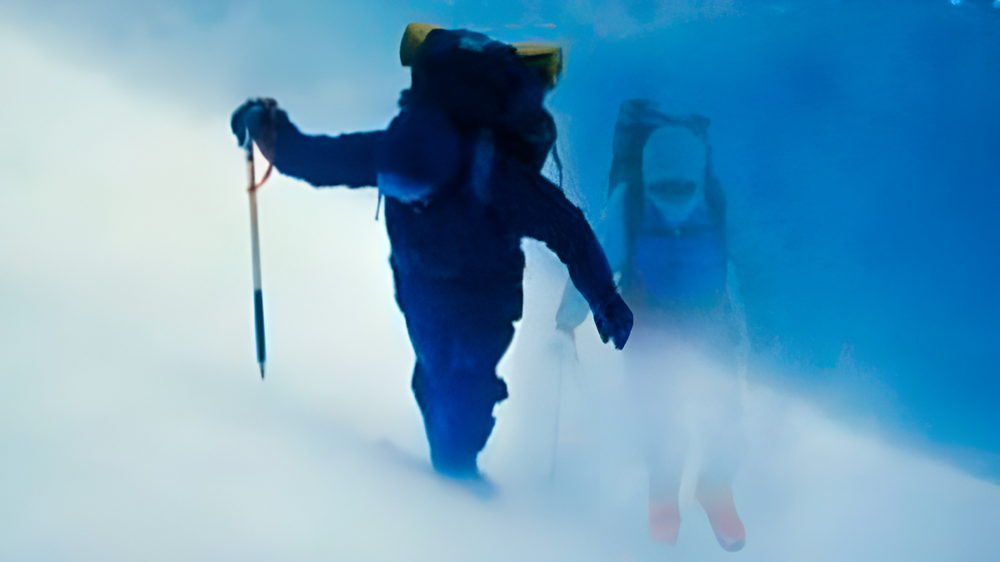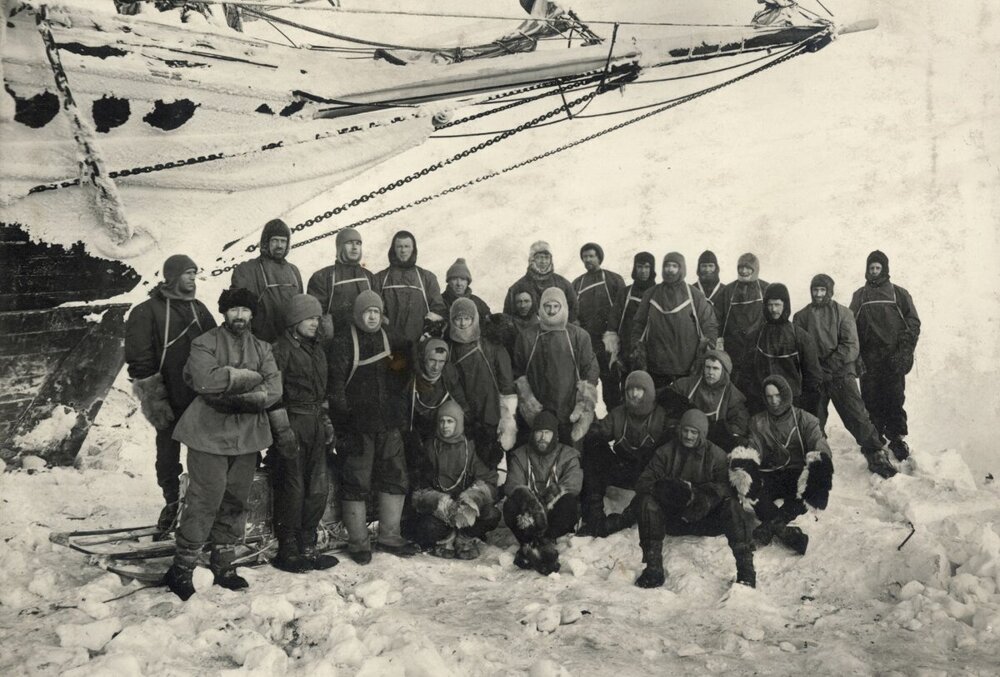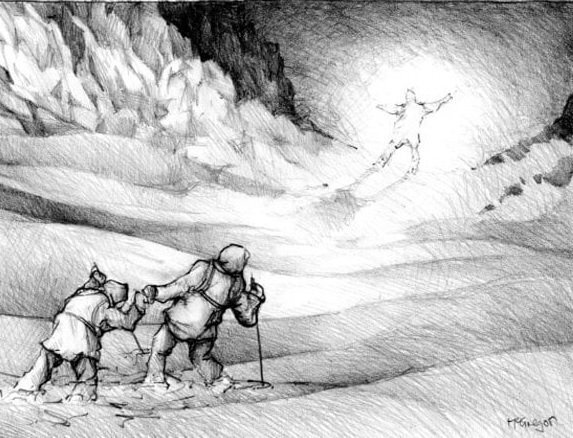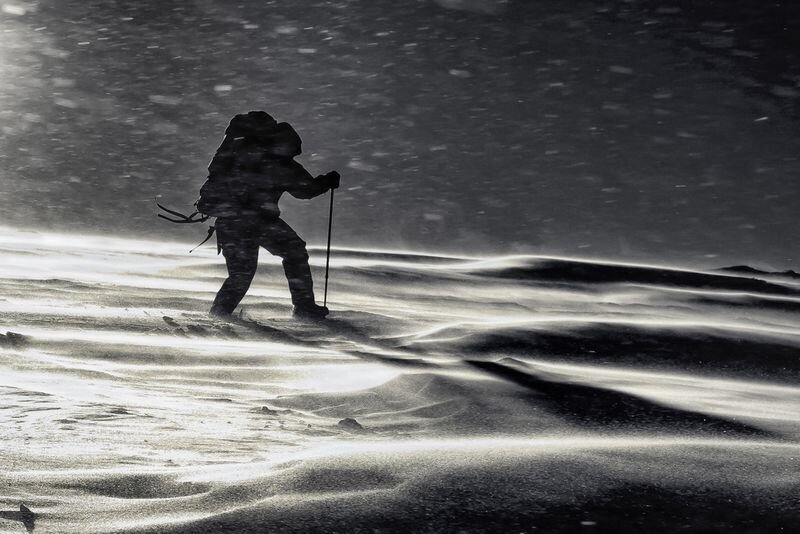What is “third person syndrome” (4 photos)
Does it only happen to those who are on the verge of life and death? 
In December 1914, the famous Anglo-Irish navigator Ernest Shackleton sailed on his ship Endurance to Antarctica, intending to become the first to successfully complete a trans-Antarctic expedition.
However, he never expected that his ship would get stuck in the pack ice and the entire crew of 28 people would have to survive on the floating ice in severe thirty-degree frost for several weeks, hoping that the pack ice would loosen the grip of the ship and free them from captivity in the ice.
Already on October 24, 1915, the strong pressure of ice from the starboard led to the destruction of the wooden structure and the formation of a hole, which is why the ship sank in one of the most dangerous places on Earth, and the crew was left to survive on the ice without hope of rescue or the ability to call for help. 
After the ship sank: Shackleton's crew had to survive. For almost 2 weeks, Ernest Shackleton led his men across the ice, trying to get to land. Until finally he set up camp and decided to set off in a small group on a boat to South Georgia, making a deadly voyage with the goal of reaching civilization and returning to his crew with help.
Writing about the painful and difficult journey in his diaries, Shackleton made one unexpected admission that supposedly each member of his crew saw “one extra man” next to them:
“...during that long and grueling thirty-six hour march over the nameless mountains and glaciers of South Georgia, it often seemed to us all that there were four of us instead of three.”
Thanks to Shackleton's story, more and more survivors have since come forward to talk about this strange phenomenon known as "Third Man Syndrome", where an inexplicable "ghost" appears to a person only when faced with a life or death threat.
Why is this syndrome called that? 
"Third Man Syndrome" gets its name from a poem. After learning of Shackleton's heroic survival in Antarctica, poet and playwright Thomas Stearns Eliot wrote the poem "The Waste Land" in 1922, and in one section of the long poem Eliot addresses the "third."
Who is that third one who always walks next to you? When I count, there is only you (mind) and me (body), but when I look ahead at the white road, there is always someone else walking next to you. Wrapped in a brown robe, with a hood, I don't know if he's a man or a woman.
In a footnote to the poem, Eliot wrote of the inspiration he drew from the story of Shackleton's trials: "... it was said that a party of explorers, at the limit of their strength, had the constant delusion that each of them always saw one more member of the team than he actually saw." in fact it would be possible to count.”
And it wasn’t just Shackleton’s team that experienced a similar syndrome.
What kind of phenomenon is this? 
"Third Man Syndrome" was also experienced by many climbers, most notably Frank Smythe, who came tantalizingly close to becoming the first person to climb Everest.
“The whole time I was sitting alone, I had a strong feeling that I was accompanied by a second person. This feeling was so strong that it completely eliminated all the hopelessness and loneliness that I felt,” Smythe recalled in his diary.
Lack of oxygen may have played a role, but at one point he was so convinced of the presence of this figure that Smythe even took out his rations and broke it in half, trying to give it to the mysterious figure who was supporting him.
Joe Simpson, a mountaineer who miraculously survived in the mountains and wrote a book about it, “Touching the Void,” also faced a similar situation.
It is the element of the "mystery man" who appears next to a person in a life-or-death situation that is constant in such stories - some entity appears to help you and give guidance or advice. Helps you not give up.
So is third person syndrome a kind of guardian angel or perhaps a general stress-induced hallucination?
The truth is that no one really knows.
Science has tried to explain this phenomenon with the theory of “bicameral mentality” put forward by psychologist Julian Jaynes, supposedly that the brain consists oftwo halves: one speaks, and the other listens and obeys. However, scientists consider Jaynes' hypothesis controversial and unscientific.
Some people resort to a mystical or religious hypothesis, attributing similar properties to a guardian angel or ghosts.
Whatever it is, and we may never know, the "mystery man" has saved the lives of countless climbers and explorers.
Cynic or not, it's nice to know that even in life-or-death situations, there's always a chance that you'll hear a friendly voice to help you. Even when the situation gets as difficult as possible.
This reaction is so rare and occurs under such catastrophic scenarios that it will likely never be fully understood; but the idea that part of our brain calls on a friend to help us in times of need is truly remarkable and strangely comforting.
What do you think about this syndrome? Share your opinion in the comments.























